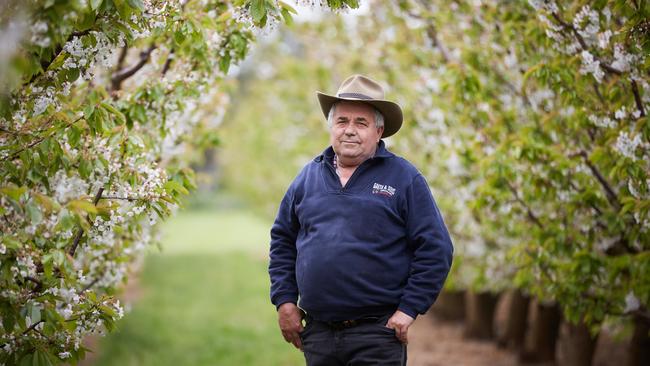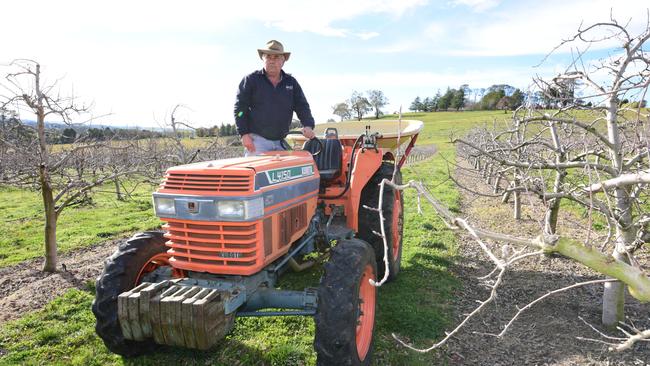Guy Gaeta tells supermarket inquiry family farms will disappear within a few years
An apple grower has told the supermarkets inquiry that while the giants ‘cry poor’ over making billions, farmers are paid as little as $1/kg and family farms are dying out.

Orchardist Guy Gaeta, who has spent 38 years in the agricultural industry, has warned Senators overseeing the inquiry into supermarkets that unless farmers are paid a fair price for their produce by the supermarkets there won’t be any family farms left within a few years.
Mr Gaeta also explained that the supermarket giants would often reject produce for no apparent reason, for example cucumbers that weren’t perfectly straight, or fruit that was slightly the wrong shade of colour, and that farmers couldn’t argue with the retailers.
He added the supermarket giants were now “crying poor” because they claimed to make a profit margin of around 2.9 per cent, but he believed this was still a reasonable return and much better than how farmers were faring.
“They are crying poor now because they only make 2.9 per cent, that’s billions, isn’t it? Show me a farmer that is making 2.9 per cent profit in this time,” he said.
He told the Senate inquiry, which is currently hearing public submissions in the regional town of Orange, New South Wales, that he had seen farmers being paid only $1 per kilo for apples, but the supermarket was at the same time advertising apples at $3.99 a kilo.
“There won’t be family farms left in five or so years, it is scary, and if you don’t have family farms you will lose your food security,” he said.
Late last year the Albanese government agreed to a Greens-led Senate inquiry into the supermarket chains, their pricing and market power, as community anger and political heat around allegations of price gouging and misuse of market power put Woolworths and Coles under the spotlight of a public Senate inquiry.
Later this month, the Senate inquiry will hear from outgoing Woolworths CEO Brad Banducci and Coles boss Leah Weckert where they will be grilled by the Senators and asked direct questions about their pricing, market power and treatment of suppliers.
On Tuesday at the Senate inquiry Macquarie River Food and Fibre chief executive Michael Drum said there was a “continual creep of costs forced upon the farmer”, coming from the supermarket sector as well as government policy, that was placing in doubt the future of the traditional family farm.
Mr Drum, whose organisation represents around 500 family farms and agricultural businesses, said there was a risk Australia would follow the lead of what was happening in the US where corporates and big businesses were buying up farms and squeezing out family farms.
“We can appreciate and understand the competition that exists at the supermarket level, and that probably has been there forever and a day, but the bit that we think is more significant is where there is this continual creep of costs that are forced upon farmers.
“And we are seeing it across the board. We are seeing it on the cost of compliance … we are seeing it in the Murray Darling basin now with government intervention into the water market.
“When they are all happening at once, the cumulative impact makes it very difficult for the farmers to make it to work if you don’t have a certain amount of scale that you can monetise the costs over.”
Mr Drum said because of this there would be likely more corporatisation of farming in Australia.
“In my view, absolutely, I think it is going to go the way of America has gone where basically corporatised entities buying up the family farm, because the family farm really can’t deal with the risk or even have the structure to deal with keeping up with the changing environment as it relates to government policy.”

In his discussion before the Senate inquiry Mr Gaeta said he no longer sold directly to Woolworths or Coles.
He said farmers were also saddled with a punishing quality control regime and that the supermarkets would often reject produce for no apparent reason, leaving the farmer holding perishable goods that were then almost worthless.
“The way they reject fruit, it’s for no reason, and you can’t argue with them, they can reject fruit because, like for cucumbers, it’s not perfectly straight, or they reject cauliflower because they are too big,” he said.
“We don’t grow the fruit in a factory, we grow them under the sky.”
Mr Gaeta said the supermarkets also saddled farmers with expensive quality assurance programs and systems that cost farmers tens of thousands of dollars.
He said farmers were struggling just to meet their costs with the supermarkets rejecting fruit for no reason, and when they did pay they were pressing down on prices while charging consumers much higher prices.
Mr Gaeta said he recently transported fruit for a neighbour to a buyer, who bought for the chains, and when they tried to reject it over some discrepancy over the colour of the apples he put up such a fight at the warehouse that eventually it was waved through.
“You don’t buy an orchard to make money,” Mr Gaeta told the Senators. “We have got to expose them (supermarkets) for what they are and when they reject something it has to be for a reason and I don’t know any farmer who would put something in a box to reject it, it’s crazy.”
Later in the afternoon the inquiry heard from Greenlife Industry Australia CEO Joanna Cave, who represents thousands of plant growers and whose major customers are bigbox hardware retailers such as Bunnings and Mitre 10.
Ms Cave said plants were categorised as food and groceries but that retailers such as Bunnings were not part of the code of conduct that currently exists between suppliers and the major supermarket chains Woolworths, Coles, Metcash and Aldi. She said Bunnings had a dominant 70 per cent market share of the sector and could negotiate from a position of strength to suppliers, often renegotiating contracts and changing volumes which could damage plant grower profitability and threaten the viability of their business.
Ms Cave said bigbox hardware chains like Bunnings created a “false oversupply” in the market, and that many of her members were too scared to speal out about their treatment from the large hardware chains due ot fears of retribution. However, she added, it was in the interest for retailers such as Bunnings to be successful as it drove demand for her members.
She called on Bunnings to be included in the food and grocery code of conduct and that the code be made mandatory rather than voluntary as it is now.








To join the conversation, please log in. Don't have an account? Register
Join the conversation, you are commenting as Logout